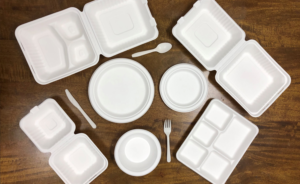
By Wendy Osher
Ilio Products, the Hawaiʻi distributor and developer of Mālama Eco Products, on Thursday launched a business division to service local businesses statewide who need to comply with County regulations outlawing polystyrene containers, otherwise known as the “styrofoam ban.”

Maui’s law was enacted on Dec. 31, 2018 [1] and the Big Island will implement a similar on July 1, 2019. Meanwhile the Hawaiʻi State legislature is expected to see legislation introduced in the 2019 session aimed at enacting a similar ban statewide in the near future.
For years Mālama Eco Products has sold a wide range of eco-friendly disposable plates, bowls, trays, utensils and chopsticks, as well as resealable storage and freezer bags statewide at Don Quijote, Walmart, Walgreens, KTA and more. With the new division, local restaurants can now order the following items direct in bulk ranging from 200 to 1,500 pieces:
Take-out containers/plates
- 8-inch clamshells (3 compartment)
- 8-inch clamshells (1 compartment)
- 6-inch clamshells (1 compartment)
- 8.6-inch lunch plates
- 7-inch dessert plates
- 12-ounce bowls
- Luau trays
*Items are fully compostable, made of sugarcane pulp. Will not leak. Items will break down based on ASTM D/6400 standards, on average this is six to nine months to breakdown.)
Utensils (Compostable, made from cornstarch)
- Forks
- Knives
- Spoons
*Items are compostable and biodegradable, and made of cornstarch. Fork tines will not break off into sharp shrapnel, as opposed to plastic forks. Items will break down based on ASTM D/6400 standards, on average this is six to nine months to breakdown.
- Bamboo chopsticks (*Made of a sustainable species of bamboo that grows on average a foot a month.)
 David Pang, Owner, Mālama Eco Products
David Pang, Owner, Mālama Eco Products
“Our belief in starting Mālama Eco Products was if we could make a line of eco-friendly products similar in pricing to plastic and polystyrene, people would choose the eco product every time,” said Ilio Products’ David Pang. “We spent years researching how to make this happen and what the impact would be to Hawaiʻi. We launched our eco-friendly products in 2012 and have been helping local people of all income levels save money AND help our ʻāina. When you can do something that is good for the environment and save money at the same time in your everyday life… that was and still is our goal. Now, with the new laws coming online, we wanted to launch a division to service local restaurants.”
According to a City of Honolulu audit released last month, one “locally famous” restaurant interviewed told auditors it currently spends $4,000 a month on containers, and the transition from styrofoam would cost at least $10,000 a month – too much for the business to bear.
“That famous restaurant should find a new supplier,” said Pang in reference to the City Audit. “Based on the restaurants and schools we have worked with, we haven’t found this to be case. One school actually started saving money by switching from Styrofoam and plastics to Mālama Eco Products for its plates, bowls, clamshell containers and utensils. Just think of that impact – both to the school and the environment.”
Pang continued, “I would love to talk to anyone who thinks eco-friendly products are more than twice as much. For example, our luau trays are 14 cents apiece, while a 6-inch carry out container is 11 cents. Meanwhile, our utensils are 3 cents apiece when a restaurant buys in bulk. The misconception that eco-friendly breaks the bank is bad for our ʻāina and bad for the state. We can do this, and the eco products net average price pretty much equal out. Some items are a little more, and some things are a little less. But the net is about the same.”
Currently Giovani Shrimp Trucks, Panya Bistro, Doraku Sushi, Blue Tree Café and Hi Tea Cafe use Mālama Eco Products.
“I grew up in Hawaiʻi and spent a lot of time outside surfing and fishing. I’ve seen the litter problem grow and grow. People are always talking about cleaning up because plastic and chemicals are making their way into our streams, oceans and eventually the food that we eat.… what if there aren’t any toxins or plastic to clean up? We know sometimes people will make bad choices and litter. How do we minimize that impact?”
“With the birth of my youngest son, I wanted to make sure the things I loved about Hawaii growing up, will be here for him to love to. So that’s why I started Mālama Eco Products,” Pang said. “With the premise that if eco-friendly products were the same price as plastic or Styrofoam, people would buy eco. That in turn would naturally help the environment. It becomes a routine in your everyday life. Buying things they would normally buy, and saving money, they are helping the environment.”
Mālama Eco Products are available at Don Quijote, Walmart, Times Supermarket, Foodland, Safeway, Walgreens, Tamura’s, Waiʻanae Store, Nānākuli Superette, KTA on the Big Island, VIP on Maui, Big Save on Kauaʻi and Friendly Market on Molokaʻi. Restaurants interested in learning more can call (808) 486-4546.
Article printed from Maui Now: http://mauinow.com
http://mauinow.com/2019/01/18/business-helps-restaurants-comply-with-polystyrene-ban/
